Telephone Operators Join Our Army - 1918
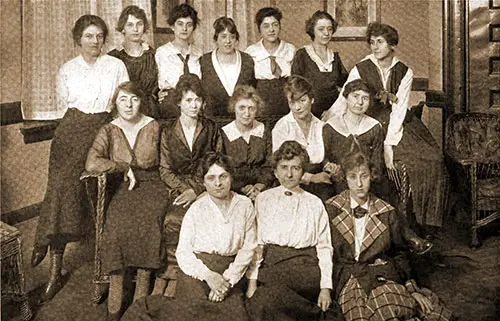
Volunteers Who Are in Training to Operate the American Telephone System in France for the Army under General Pershing. The Telephone Review, March 1918. GGA Image ID # 19830c0ea1
Left to right—
Bottom row: Mrs. Juliette A. Chalvin (Miss Katherine M. Schmitt, Manager New York Telephone Company's Training School for Operators;, Miss Ester Fresnel.
Middle row: Miss Louise Essirard, Mrs. Marie A. McIntyre, Miss Marthe Liebert, Miss Fernande J. Van Balkom, Miss Grace D. Banker.
Top row: Miss Ethelyn White, Miss Marguerite S. Bleyeres, Miss Suzanne M. Beraud, Miss Charlotte M. Gyss, Miss Marie L. Beraud, Miss Suzanne Prevot, Miss Frances Bigelow Paine.
General Pershing Wants Volunteers to Operate American Telephone System in France —Must Be Bi-linguists — Other Qualifications Necessary —Telephone Companies Selecting and Training Applicants
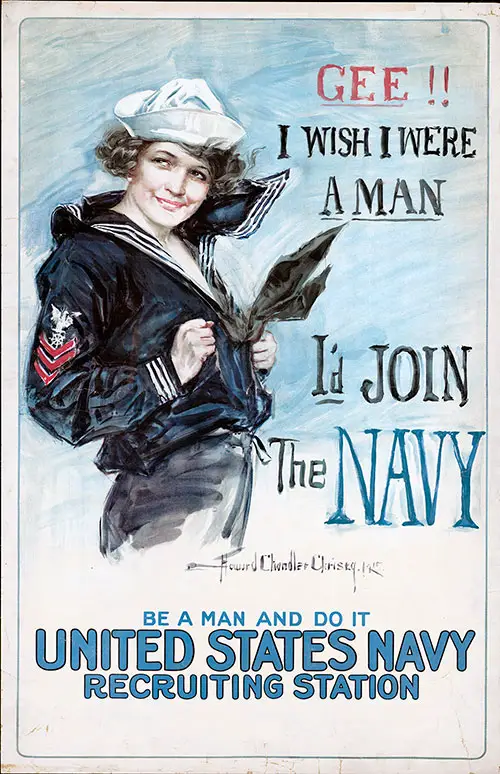
Gee -- I Wish I Were a Man -- I'd Join the Navy -- Recruitment Poster, 1917. Be a Man and Do It! United States Navy Recruiting Station Poster Showing a Young Woman in a Navy Uniform. Created by Howard Chandler Christy. Library of Congress LC 2002712088. GGA Image ID # 187598010e
Have you ever seen that United States War Poster depicting a jaunty, happy-looking young American girl, decked out in a sailor's uniform, who declares, with her head on one side, "Gee, I wish I were a man ! I'd join the Navy" ?
Many a girl, in passing that poster, has looked at it and wished the same thing, be cause up to the present time there has been little active work, outside of helping at the Red Cross Society and doing the regulation thing, that a girl could do.
So one looked at the mischievous girl on the poster, and agreed with her, and then dismissed the subject as an impossible one: For any one without the necessary specialized training, there seemed to be no place abroad with the American Expeditionary Forces under General Pershing.
But now, in his characteristic way, Uncle Sam has sent out a call, that has been heard all over this big country. This time, it is not a call to arms; it is not a call for money, for shipyard workers, or for any of the other numerous things needed to expedite the war; but for women to fill as im portant a place as any of these.
In short. Uncle Sam wants "Soldiers of the Switchboard" to go abroad, and wants them at once, for without them the work of his army will be greatly hindered.
The American Telephone in France "Over There" great things are in progress. Behind the lines, history is being made. It is not the history of battles alone, but of industrial effort.
Behind our men at the front there must be an army of tireless workers to furnish them with all the requisites for modern warfare.
It is said that every man in our fighting force overseas needs an average of five tons of food, supplies, and ammu nition every year. Are our Allies sup plying them with these things? Far from it.
Not only is the United States supplying them for her own men; she has undertaken to produce them for her companions at arms as well.
To do this, it has been necessary to think and work in terms of millions and billions instead of thousands; to manufacture on a scale the like of which was never known before, and to transport across the seas, in the face of the submarine terror, men and equipment to an extent never dreamed of in years gone by.
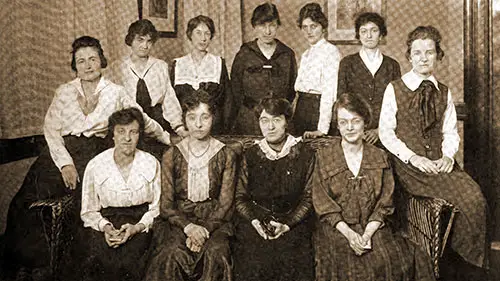
Volunteers Who Are in Training to Operate the American Telephone System in France for the Army under General Pershing. The Telephone Review, March 1918. GGA Image ID #
Left to right—
Lower row: Miss Catherine H. Robinson, Miss Helene F. Perreten, Miss Marthe Gay. Miss Edme Le Roux.
Upper row: Miss Frances Des Jardins, Misa Juli Barere, Mrs. Pauline McDermott, Miss Suzanne Cohleach, Miss Darnaby Henton, Miss Marion A. Taylor, Miss Anne C. Fox.
The American Way
They say the American mind is virile, and ready to tackle any problem. That is true, and we not onlv tackle it, but we stay at it until we finish it to our satisfaction.
In the solution of this greatest of all problems that has fallen to our share in the war, plans are being worked out so that there will be no danger of the failure of our army because of lack of food for the "War God." in the shape of equipment, munitions, and general supplies.
Great factories and ware houses of reinforced concrete are be ing erected. Railroads to transport necessities from the seaboard have fceen constructed, and they are real American railroads, too, built with American materials, by American engineers, and manned and operated by our American boys.
Millions of tons of shipping have been commandeered or built to carry our precious cargoes to our men abroad. Camps and supply bases have been constructed, which are American from beginning to end, inhabited by American troops, supported by American spirit, food, clothing, and ammunition, and last but not least, connected together and to the outside world by a real American Telephone System, constructed by our own American Signal Corps Telegraph Battalions.
This telephone system now covers our entire war plant. It is possible to telephone from General Pershing's headquarters to the farthest billets and camps in which our men are stationed, and to the various villages throughout France, for this American system is also connected up with the French system of telephones.
The Call to the Switchboard
Uncle Sam wants our own American girls to operate this new telephone plant. He does not wish to make England's mistake, afterwards corrected, of using men who are needed at the front, for work which girls can do better than men.
So General Pershing has asked the Chief Signal Officer at Washington to engage and send to France as quickly as possible a detachment of telephone operators.
The girls who are selected for the post will have in their hands the wires that serve as the nerves of our army in France.
Through their central offices will pass messages of the greatest import, for each of these offices will be a sort of clearing house for all the business of war in the American zone, and much of our success will depend upon the facility of the operators in the handling of the calls that come in.
Telephone Companies Assist
Through the newspapers, a call was sent out by the Chief Signal Officer, setting before the public the need for operators, and stating the requirements for applicants, with the result that the Signal Corps Office was swamped with answers from all parts of the country, from Maine Signal Corps turned to the telephone companies.
Among others, the American Telephone and Telegraph Company was asked to assist through the vast organization and resources of the Bell System in selecting, training, and organizing the proposed units of telephone operators for France as they are needed from time to time.
The portion of the work that has fallen to the share of the New York Telephone Company is being handled from Traffic Headquarters in New York by D. D. Field, District Traffic Manager, Manhattan and Bronx Division.
Qualifying for Work in France
There are girls and girls, and some are best for one situation, some for another, but there is only one kind that will fit into the present one.
The New York Telephone Company, in acting for the Signal Corps, is choosing only girls who can "go it on their own," and who, instead of being a burden to our army in France, will be a help.
The girls who go over must be the type that will not falter in the presence of emergencies or discouraging conditions. They must be ready to go forward with a steadv determination to see it through —to do their share, and to do it with a right good will, in spite of all obstacles.
There must be no faint heart or weak will. And the reward will be the satisfaction that comes with the knowledge of work well done, accomplished against great odds.
Already many have been found who have qualified, and some are expecting to leave shortly for the other side. These girls can bear witness to the thoroughness and. care exercised in the selection of the operators.
Naturally, applicants of every kind and condition appear for examination. They come from every quarter and from every profession. Girls with a thirst for adventure arrive and depart unsatisfied. Girls in need of a position do likewise.
There are large girls and small girls, young and old, but the greater number fail to meet the requirements, for a variety of reasons, although most of them are actuated by high motives, and are eager to go.
There was even an application for the position of chaperon! For the type of girl needed, a chaperon would be superfluous, and she departed, disappointed.
Parlez Vous Français?
Many lack the ability to speak French as well as English, and so are disqualified at the outset. As the operators at the switchboards in France will have to be able to transmit messages in both languages, and do it without loss of time, and without hesitation, there must be no question about their ability to speak French fluently.
Imagine an excited Frenchman with an important communication to make, but unable to speak English, or vice versa, and an operator without a good working knowledge of both English and French — who understood little and spoke less —and you will understand why it is absolutely necessary for the girls who are chosen to speak both languages so well that they pass from one to the other unconsciously!
"Why Do You Want to Go to France?"
But that is not the only requirement to be met by applicants. Every girl who is considered for the post is asked a simple question— simple, but much depends upon the answer. It is, "Why do you want to go to France?"
There could be but one answer accepted as satisfactory, and it has been given by all the girls who have been chosen. First, there are our own American girls, American born and bred, who for love of France and their native land, have leaped to the opportunity to enlist in the battle for civilization.
Then there are girls, foreign born, but American by adoption and spirit, whose one aim is to get into the fight for humanity "over there," and to get into it right away.
One apparently timid little girl who had seemed rather dispirited, sprang up, and choking with emotion and tears, pounded the table with her fists, and cried, "You ask me that ! You ask me why I want to go to France, after what I have told you the Germans did to my home and my family!
I would go a thousand times, even though I knew the day I landed in France would be my last." Imagine girls whose family history reveals the scars of the Alsace-Lor raine struggle in the 1870's, others who have lost home and family in the present war —girls who have, every one of them, a tale to tell of brothers, fathers, cousins, or friends who have already given up their lives to this modern minotaur, and you will know beforehand their answer to the question.
"I want to go to do what there are no longer any of my family left to do— to fight, in this, the only way I can, and to help win the war." "To fight and win this war" — that is the only answer that can be accepted.
Only the girl with this purpose, and the burning determination to accomplish it, may go. Excitement and the novelty of the thing are not sufficient reasons.
All who have acted with such an incentive have been eliminated in the selection of the units. Behind every single girl who has been selected is a story that has crystallized her purpose, and awhite-hot enthusiasm that admits of no opposition. Each is going because she wants to help, be cause she cannot stay away, and will not be kept back.
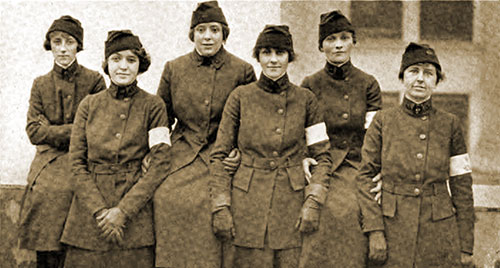
Telephone Operators Ready for France: Left to right: Miss Esther Fresnel, Miss Suzanne Prevot, Miss Charlotte M. Gyss, Miss Frances Bigelow Paine, Miss Fernande J. Van Balkom, Miss Grace D. Banker (Chief Operator). The Telephone Review, March 1918. GGA Image ID # 19834cb33f
Why Personality Counts
Personality is a rather over worked word, but nevertheless has an important place in our every-day vocabulary. Personality and ability are among the most important quali fications of a successful telephone operator, and in forming the units thai are to go to France, they are considered essentials, regardless of operating experience, station in life, or other circumstances.
While operating experience is desirable, of course, in this case it is of secondary importance. One need not be an operator in order to qualify.
The Telephone Company will take care of that end of it, and engages to give the girls the proper instruction and mechanical training be fore they are sent over.
The Company realizes that these telephone units will represent the United States and the other telephone operators throughout the country. Is it any wonder, then, that personality counts, and counts high?
When a girl has met all other requirements, there is her physical condition to be considered. If she is not constitutionally strong enough to stand a rigorous life (for the girls do not expect to lie on a bed of roses), there would be no use in her going over.
Those selected by the New YorkTelephone Company have passed this test, as all others who follow will have to, and. while they may not have to stand anv hardships, they will prob ably live the simple life, devoid of most luxuries.
This, however, should appeal to many, for it seems to be agreeing with our boys in the service, almost every one of whom has gained in weieht and improved in appearance since he entered upon the so-called rigors of camp life.
Training for Work in France
Take such a set of girls as those selected by the New York Telephone Company, and imagine with what expectancy they are awaiting their final call!
The first part of their training —and this applies to those who have had experience in telephone work as well as those who have not — consists of a very intensive course in the training school for operators, designed to make them thoroughly familiar with the groundwork of the science of operating, and to give them the telephone habit and the telephone manner. The lectures and instruction in the theory and practice, combined with actual work at the switchboard, fit the new girls for the next step —actual operating experience.
Through the active interest and cooperation of a number of subscribers having large private branch exchange switchboards, the students are given an opportunity to handle commercial business as a part of their general ex perience in telephone work.
This is followed by a period of training in the telephone central offices at Camp Merritt, New Jersey, or Camp Upton, Long Island —under military conditions resembling as closely as possible those which they will find in France.
After this they are taken into various central offices, where they work until the day they step aboard their transport.
Girls in Blue
Every soldier must have a uniform, and the telephone operator units, being part of the army organization, are no exception to the rule. The uniform adopted is navy-blue in color, the cloth a soft unfinished worsted, and the material and workmanship — to quote the makers—the best to be had.
The equipment of outer clothing for each girl is as follows: two hats, one of velour with a brim, and the other of the same cloth as the uniform, modeled along the lines of the aviation cap; one ulster, full length, lined and interlined, and proof against the cold; one suit coat, or blouse, as it is called, modeled along the lines of a sport coat; one or two walking skirts, extra high tan walking shoes, and so on to the limit of baggage allowed.
Appointment to Duty
Each girl who has qualified, is the proud possessor of a document, with variations to suit her case, of which the following is a copy:
WAR DEPARTMENT Office of the Chief Signal Officer Washington, D. C. Date
From : Office of the Chief Signal Officer.
To : Commanding General, American Ex peditionary Forces, France.
Subject: Appointment.
1. The bearer _________________ was this date appointed Operator, Telephone Unit, in the Signal Service at Large, at $60 per month, with allowances of rations, quar ters and medical attendance accorded Army Nurses by Army Regulations, as provided in authority from the Secretary of War, of date November 28. 1917, and will be directed to report to you for as signment of duty, upon completion of preiminary course in school of instruction for telephone operators. She executed the oath of office (date) and entered upon duty (date)
2. In case of emergency, notify : (Name of person to be notified) (Address) By authority of the Chief Signal Officer, (Signature) E. Wesson. Captain Signal Corps, U. S. R. Vaccination Register.
Pay Plus Maintenance
The salary offered by the Government for this service is: sixty dollars, seventy-two dollars, and one hundred and twenty dollars a month, respectively, for operator, supervisor, and chief operator.
In addition to this, there is an allowance, or so-called commutation, of four dollars a day for the first thirty days, or until the individual leaves the country if before that time limit.
After thirty days, the monthly allowances, in addition to pay, are thirty dollars for lodging, twenty-four dollars for food, and six dollars for light and heat.
If the individual is lodged and fed by the Government, the allowances are, of course, not granted. All necessary expense incurred in traveling is refunded.
It is, in fact, the intent of the Government that the actual pay of the operators will be free and clear. How that will work in actual practice remains to be seen, but we are assured that if it does not so develop, the arrangement will be so altered as to achieve that purpose.
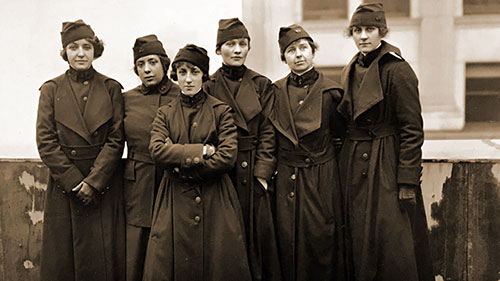
Part of the First Unit to Go in Their Service Overcoats. The Telephone Review, March 1918. GGA Image ID # 19841bcbdc
Waiting for the Call
Day by day these operators have studied and worked, always looking forward to the time when they will go over. Always, not far below the surface, that undercurrent of thought lies.
This waiting from day to day is the hardest part of their task. To make an important decision is not so easy; to follow it up with the necessary routine work connected with its accomplishment, which is bound to rob it of some of the glamour that first surrounded it, is still less easy; and to wait and wait for something to happen is hardest of all.
But the end, and not the means to the end, is the important thing, and if the girls could not stand the test of the work and waiting now, they would not be the right kind of "soldiers" for this telephone army.
On the Wings of Victory
Their task will have its compensations. They will not be numbered among the people who must stand back and let the others go for ward who must plod on from day to day, performing tasks that, though prosaic, are all-important, and best fitted for their talents and training.
We need both kinds of workers —those that go to the front, and those that keep the home fires burning, for without the one, the other would be helpless.
Both do their share, and both will feel, when Victory is won, that the struggle of the nations has made them better men and women than they were before; that while it has given them battle scars, it has also taken them out of the petty rut of daily life, into which they had fallen, and blessed them with broader vision and greater souls.
"Telephone Operators Join Our Army: General Pershing Wants Volunteers to Operate American Telephone System in France —Must Be Bi-linguists — Other Qualifications Necessary —Telephone Companies Selecting and Training Applicants," in The Telephone Review, Vol. 9, No. 3, March 1918, pp. 70-73
